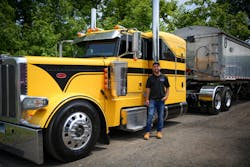This is Part 2 of a three-part story. Read Part 1 here.
When it comes to the impending heavy-duty truck prebuy to get ahead of the EPA 2027 low-NOX rule, every solution right now in trucking is like a monkey’s paw, none problem-free. But if you’re careful with what you wish for and make a very calculated wish, you should still be in business in 2028. (No one ever said trucking was for the faint of heart.)
“It’s a scary decision to make,” explained Christopher DeFeo, owner and president of DeFeo Materials, a river stone wholesaler in Connecticut. “The new truck market is very high—and not going to come down—matched with very high interest rates. That right there is keeping me from ordering trucks.”
The Federal Reserve eased the interest rate by 0.5 percentage points in September, though DeFeo believes he has about four to six months to make a decision. Perhaps after the election, the rate will drop another 1.5%, he opined; however, buying a new truck is about more than just interest rates.
“You have to look at your debt-to-income ratio … and is the cash flow going to be there to continue to support making these massive payments?” the 29-year-old business owner asked. “Not to mention, are we going to sell a truck that has a 60- or 72-month loan after three or four years—when we already paid mostly interest and now we’re on the equity portion?”
He said when deciding to purchase or lease, review the amortization schedule to calculate the remaining loan balance at estimated time of replacement or sale.
DeFeo, whose trucking career started at age 15 driving on a wheat farm, has been around long enough to not act impulsively and stretch beyond his means, even though some are predicting the changes to MY2027 engines will increase new truck prices by up to $30,000. He believes dealers’ push to prebuy are hiding a more clear-and-present danger.
“They’re trying to scare [fleet customers] more about what could happen with 2027 emissions instead of the actual reality. Is there even going to be enough profit or business to justify buying a new truck at the current prices?” DeFeo questioned. “Forget about the next 30 grand.”
What makes this more difficult is that for fleets with under 10 trucks, which is about 95% of them, the owner has to fill several roles.
Read more: How to calculate a shop budget
“You have to be everything: a debt manager, a mechanic, a driver, employee manager,” DeFeo said, adding people in his position must also monitor records and keep up on rules and regulations.
For now, DeFeo has enough to get by with a quarry lease, five vocational trucks—a 2004 Kenworth W900, three 2019 Peterbilt 389s with tri-axle dump beds, and a Western Star 49X, plus more than 15 pieces of heavy equipment and 80-plus rail cars. He also has his sights on expanding the stone business to other regions and trying to rely less on the trucks to bring revenue.
But he can’t ignore the trucks or their TCO.
These trucks are all around the 500,000-mile mark, and operating in a quarry hauling rocks is the vehicle equivalent to working on a chain gang. It wears you down.
DeFeo is already seeing the early signs. Emissions issues on a few of his trucks gave the company fits in spring, which had the foreman handle what diagnostics and preventive maintenance he could; the rest was outsourced. That gives him pause in considering the used market.
“You’re either paying the bank or you’re paying the mechanic and the bank because you still have a payment on a used truck,” DeFeo said. “This is why we went to newer trucks because the downtime was eating us alive.”
Newer trucks are also less likely to be put out of service by inspectors. Those violations cost money to pay for repairs, fines, and insurance increases, he said.
So, should DeFeo sell the used trucks he has and go new?
“Right now is not the time to sell because of how bad the used-truck market is,” he said.
According to Hadley Benton, VP of business development for Fleet Advantage, he’s right. “Used-truck prices are at an all-time low,” he explained. “We’re kind of coming out of the bottom of that cycle right now.”
The top of the cycle was during the middle of the pandemic, when OEMs were playing catch-up after shutting down, and the lack of key parts such as semiconductors kept orders from being fulfilled, raising the demand for existing vehicles. And the prebuy may create a similar situation.
“We anticipate that there will be a surge in the used market,” Benton said. “If you’ve got used equipment that is in good working condition, and we’re sold out in ’26 as everybody expects us to be, then we should end up back in a situation like where we were with COVID.”
About the Author

John Hitch
Editor-in-chief, Fleet Maintenance
John Hitch is the award-winning editor-in-chief of Fleet Maintenance, where his mission is to provide maintenance leaders and technicians with the the latest information on tools, strategies, and best practices to keep their fleets' commercial vehicles moving.
He is based out of Cleveland, Ohio, and has worked in the B2B journalism space for more than a decade. Hitch was previously senior editor for FleetOwner and before that was technology editor for IndustryWeek and and managing editor of New Equipment Digest.
Hitch graduated from Kent State University and was editor of the student magazine The Burr in 2009.
The former sonar technician served honorably aboard the fast-attack submarine USS Oklahoma City (SSN-723), where he participated in counter-drug ops, an under-ice expedition, and other missions he's not allowed to talk about for several more decades.
